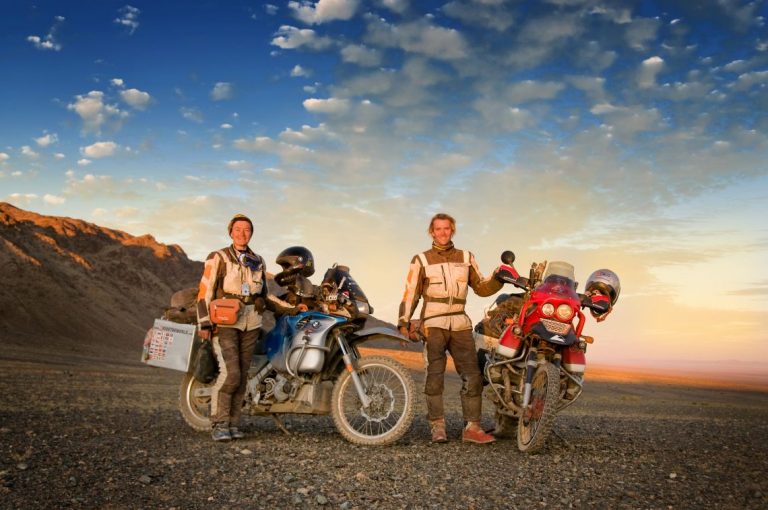Lisa and Simon Thomas have been travelling the world for an incredible eleven years. We catch up with them in an extended interview to find out more…
Who are you?
We are Simon (44) and Lisa Thomas (52). We are a Brit couple who were living in Somerset before we hit the road.
What were you doing before all this?
Immediately before we left Lisa was working as an IT professional with South West Water. Simon was the MD of his own telecommunications business.
What was the catalyst/what made you go?
Lisa: Looking back we’d like to say the catalyst was all of our cumulative years before the journey started. But more specifically we had one very bad spell where my father was rushed into hospital for a quadruple heart bypass.
Simon’s mother was diagnosed with breast cancer and Simon got sandwiched between two cars on his brand new (26 days) 1100GS, which almost took off his right foot. The result of which was five major reconstructive surgeries, over a year of being horizontal and then the process of learning to walk again.
We decided we needed a career break and realised we could just about afford to travel for 18 months and then happily return home to pick up where we left off. Eleven years later…
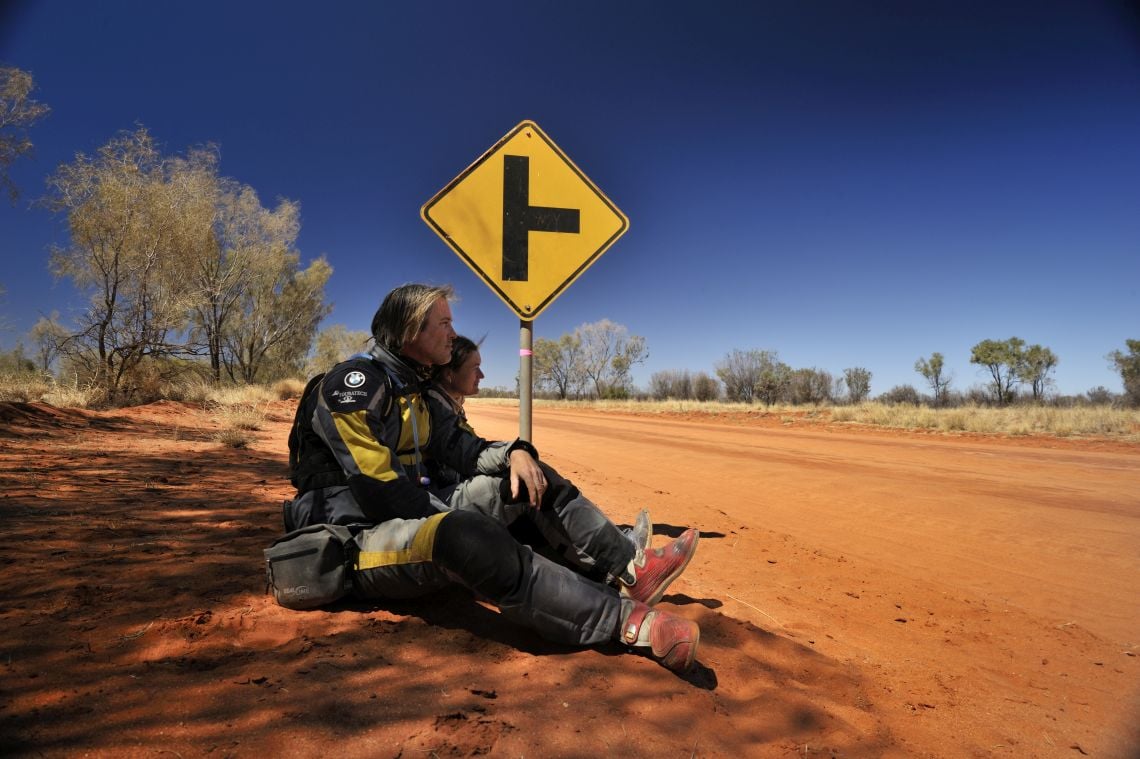
Was this the first time you’d done something like this?
Yes. We’d taken a few smaller bike trips and we knew we loved to travel, camp, ride and explore. But we had never had the time or money to do anything longer than a few weeks. It took a lot of planning to organise an 18-month break.
Describe that first day on the road.
It was a mixture of immense excitement and sadness. We’d spent years fantasising about all the adventures we were going to have, but there was also a feeling of panic as to whether all of our preparations were going to pay off and the idea of leaving everything and everyone we knew behind for a period of 18 months.
What was the hardest hurdle to overcome before setting off?
Making the decision to actually leave. After that, it should have been a matter of logistics, but things are never that simple.
Did you know you were going to cover all that distance when you first set off?
We had planned to reach 122 countries and all 7 continents in the 18 months we thought we’d be travelling. We still have those same goals but looking back we may have been a tad optimistic on the time frame!
How do you feel when you look at the map and think you’ve been to all those places?
F*ck me!
How do you decide on where you’re going to go; which country you’re going to go to next?
Simon: My wife tells me and then I follow her! The upside of this is when it all goes wrong it’s not my fault.
Lisa: I design much of the route. It’s a route that has not really changed much from when I first sat staring at the large world map on our kitchen wall. Certain parts have had to be altered due to wars, visas, money, bears, jellyfish and acts of God, but we always have a roughly planned route and agenda.
I have found that travel planning is a lot easier nowadays than it was 10 years ago. Electronic devices, the internet and access to information has made the world a smaller place. Weather is a major factor but you are going to find yourself in a place at the wrong time of year if you travel long enough. Sometimes you want to be somewhere warm in winter – the Bolivian Altiplano for example.
What was your favourite place?
It’s almost impossible to pick one, but for sheer riding exhilaration – the Sahara desert is hard to beat, but then so is the Bolivian Altiplano and the Gobi desert in Mongolia! The list can go on… For food, Thailand is up near the top, followed by Argentina with its Beef Asado and Wine (all for pennies).
As for people, Thailand and Japan were incredibly polite places to be. South America for passion and sincerity of emotions… but you’ve never seen a real smile until you have been to ‘black Africa’.
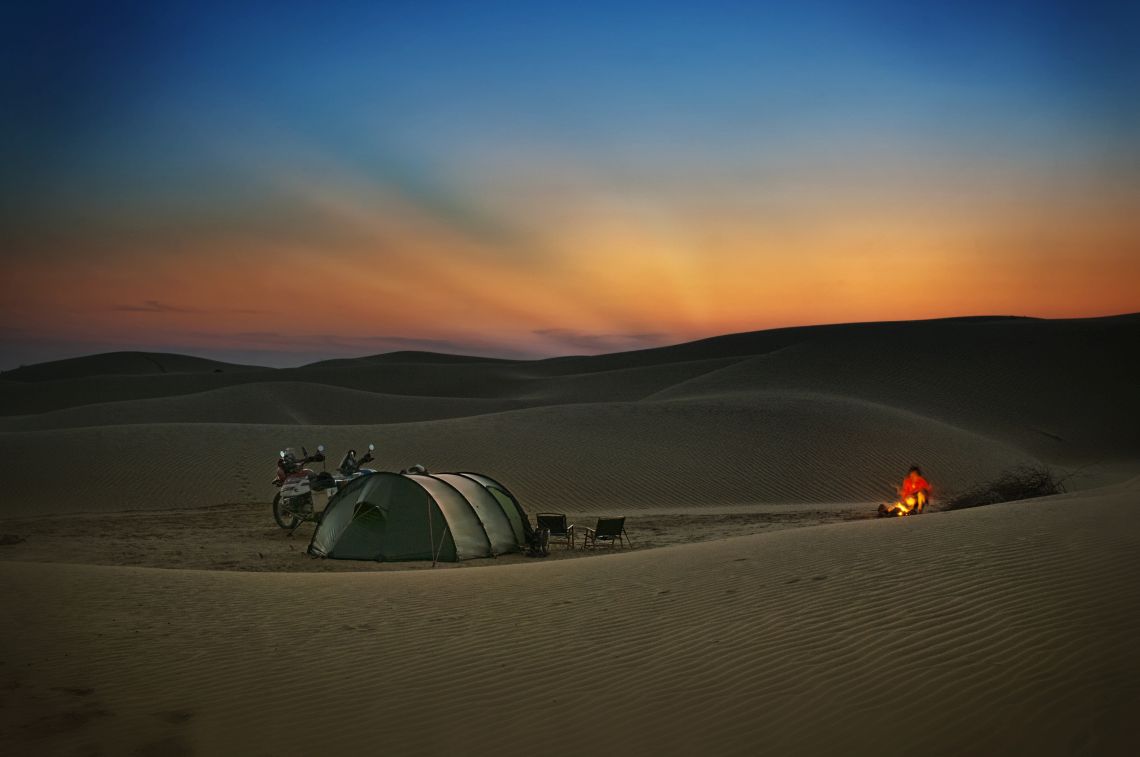
What was your least favourite place?
That’s a tough one. There are good days and bad days in every country but as for the riding the country we would choose not to go back to on big bikes would have to be India. This was however just the riding… we loved India for everything else it has to offer but the riding is a friggin’ nightmare. Do you know how India got its name?
I’ll Never Drive It Again!
Anywhere you’ve not been you’d like to have gone to?
Well, as we’re still on the road we’re still trying to get to those places! We still hope/plan to get to Antarctica (our last continent) and we are desperate to return to Africa to explore the north east.
What are the two bikes you’re riding on?
They started off as a BMW R1100GS 1999 and an F650GS 2001.
What modifications have you done to them?
The biggest mods are we swapped out Simon’s 1100 engine for an 1150 and changed his gearbox. We also upgraded to the new Touratech suspension on both bikes, installed the Touratech large capacity fuel tanks on both bikes (this mod was done before we set off).
In the last couple of years, both bikes have a 21-inch rim on the front and we’ve remodelled the cockpits; changed bars, switchgear and replaced the standard dials with the Touratech IMO display; being digital they are more robust. We kept breaking the other instruments! The list goes on… both bikes are a work in progress!
What has been your best modification?
21-inch front rim and changing the suspension.
What has been your worst modification?
Not re-enforcing the 1100GS sub-frame before we left, or installing much louder horns on both bikes before we reached India! Seriously, there has not been a major modification that we have not been happy with.
What’s been good about the bikes?
Easy maintenance and overall reliability. At the end of the day, neither of the bikes are perfect for one type of riding but they are bloody fantastic at almost all the terrains we’ve been challenged with.
What’s been bad about the bikes?
The original design of the 1100GS sub-frame. Headlight access on the F650GS unless you have hands the size of a hobbit you can’t swap the bulbs out without tearing the skin off your knuckles! Also on the 650, the OEM front springs are a little too so and the fork seals are a little vulnerable.
Has it been difficult getting spares along the way?
Lisa: Oh dear God yes! There is no way you can carry a spare for everything and sod’s law dictates that the one spare you don’t have is the exact same spare you’ll need, exactly when you’re in the middle of nowhere.
Friends, both local and internationally, can and do make a huge difference at getting you back on the road. It’s a jigsaw puzzle of logistics, trust and the ability to think outside the box.
When you’re on the road repairing a part with a brand-specific item, making it look perfect, making it look pretty, simply doesn’t matter! What matters is getting your machine rolling again and getting to your next destination safely.
These needs keenly hone your ability to become resourceful. The definition of permanent is a temporary fix that’s holding! BMW, KTM, Triumph, Honda… etc will all tell you that only brand-specific parts will work in specific high-wear areas of your bike. This isn’t true.
As an example, the butterfly valves on Simon’s 1100 GS were completely gone when we reached a small town in Peru. Finding and delivering these new BMW parts in under a month or two was nigh on impossible.
And so, we were introduced to a wizened old man known only as ‘El Maestro’, a metal worker by trade in a tiny wooden hot-box with three or four machines that pre-dated Fred Flintstone!
Within three days ‘El Maestro’ had fabricated two sets of butterfly valves, the shims, stainless steel posts and the retaining clips – all within a tolerance of a fraction of a mm, that actually fitted better than the OEM parts!
The staggering cost for his labour and materials was $15 USD, we handed him $25 as we were so grateful.
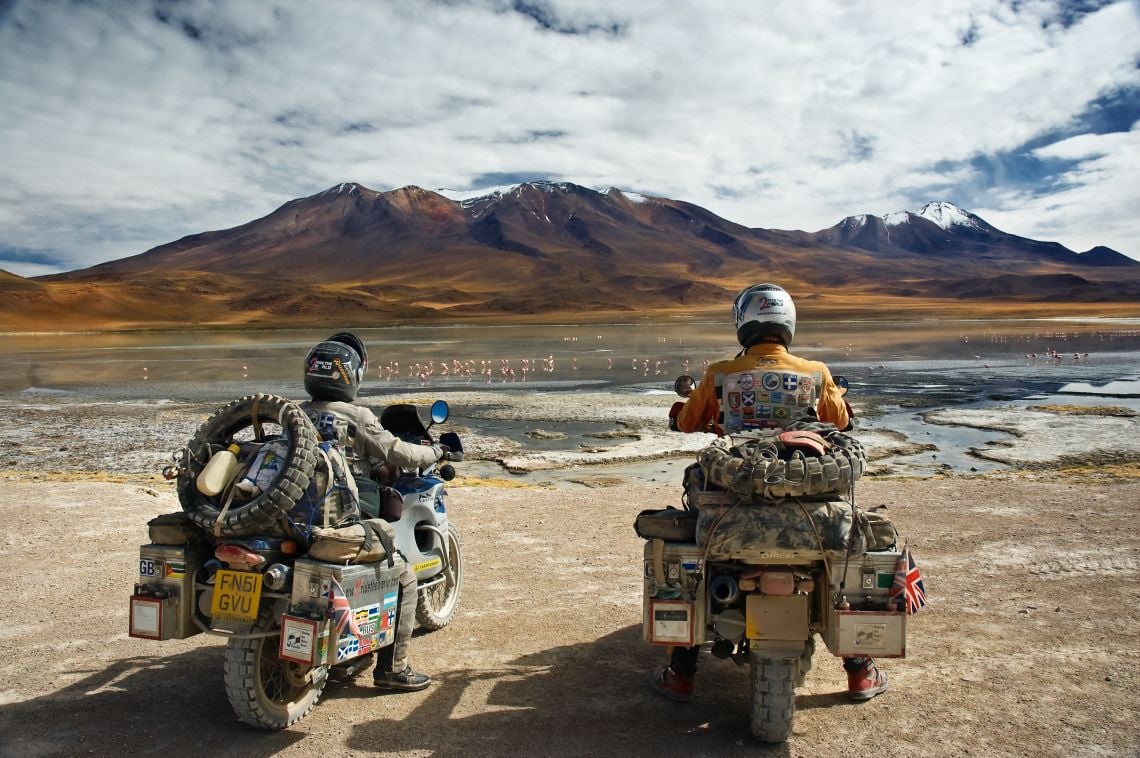
Do you regret not taking matching bikes? (for ease of spare swapping etc)
No, not really. Although two matching bikes would be convenient, the repair issues we’ve dealt with over the years have been infrequent. I think for us our bike choice has been led by the pleasure and excitement of riding our specific bikes.
Practical considerations are important but they shouldn’t override everything. Riding a motorcycle around the world as an endeavour isn’t practical, it’s an endeavour of passion. If you really want to be practical take a 4X4!
What advice do you have for someone choosing their bike for an RTW trip?
At the end of the day everyone’s advice is going to be different and opinions are like arseholes; everyone’s got one! But what’s right for one person isn’t necessarily right for the next. So choose a bike that excites you. A bike that you want to get on and ride every day. And remember, a big journey is never about the bike but about the rider and the experience.
We met six Italians crossing Mongolia on Vespas; the worlds longest ever bike ride was on a Honda Goldwing; there’s even been a few mad and brave souls that have ridden intercontinental journeys on nothing more than a moped.
Choose your bike and then do a little work on modifications before you leave. Any mods you make are no guarantee, all you are really doing is managing the risks or making a roadside repair easier.
What about insurance for the bikes; are they insured when you’re out on the road?
We can’t find anyone to insure the bikes for the way that we travel, which means that when we damage the bikes we have to sort out the repairs and all costs. Many countries now insist you buy 3rd party insurance at the border and, depending on the country, the insurance policy they give you can be worthwhile (USA and Thailand for example) or it can be as useless as a piece of used toilet paper.
Do you need to be a good rider to be able to do something like this?
No, not really. Being a good rider helps but that comes with practice and experience. The experience comes from hours, days and years on the bikes. Over the years our riding skills have improved substantially. When we left the UK the total sum of our off-road experience was two days with Si Pavey at the BMW Off-Road Skills Course in Wales.
Tell us about the Amazonian Bridge incident?
Simon: We were attempting a route north to south through the Amazon that had not been ridden by big bikes. On day two of the attempt, I fell from a rotting bridge and broke and dislocated my neck. It was a hellish three-week ride through the jungle in knee-high mud to reach medical assistance.
This was made all the worse as the fall had left me paralyzed on the left-hand side of my body and blind in my left eye. Lisa had also contracted malaria, although we didn’t know this at the time. Lisa literally pulled me out of there. We’d zipped tied my left hand to the handlebars, which was a bitch when I passed out up to six times a day.
Several times Lisa had towed me with a five-foot piece of webbing strap through the mud when my engine failed, and five feet is mighty short! It was at times truly overwhelming and one of the few times when we thought we’d bitten off more than we can chew.
We learnt a lot of about who we are, and specifically the depths of our physical and mental strengths. Painful lessons!
What do your parents/relatives make of all this?
Lisa: Well, don’t forget we were only going to be away for a career break of around 18 months. Sure, they were excited and in equal measure concerned for us. But both our families were looking forward to sharing our experiences, and of course, our return.
After so long on the road, they are still excited by what we do, but probably more concerned because of our total lack of funds. They’re also not feeling too warm and fuzzy about the condition of our homelessness, not to mention doing this at our ages. We still have incredible support from our parents though.
My father was a huge supporter and helped us deal with the ongoing paperwork that a trip like this involves. This made him deeply involved and so much part of our journey. We have found that over the years good friends and close family have remained a constant support. We do miss them all terribly.
How often do you return to England?
Currently, our finances make this impossible. We have however had some family and friends come to visit us in certain parts of the world. We’re not too sure that we would recognise the UK after so long on the road!
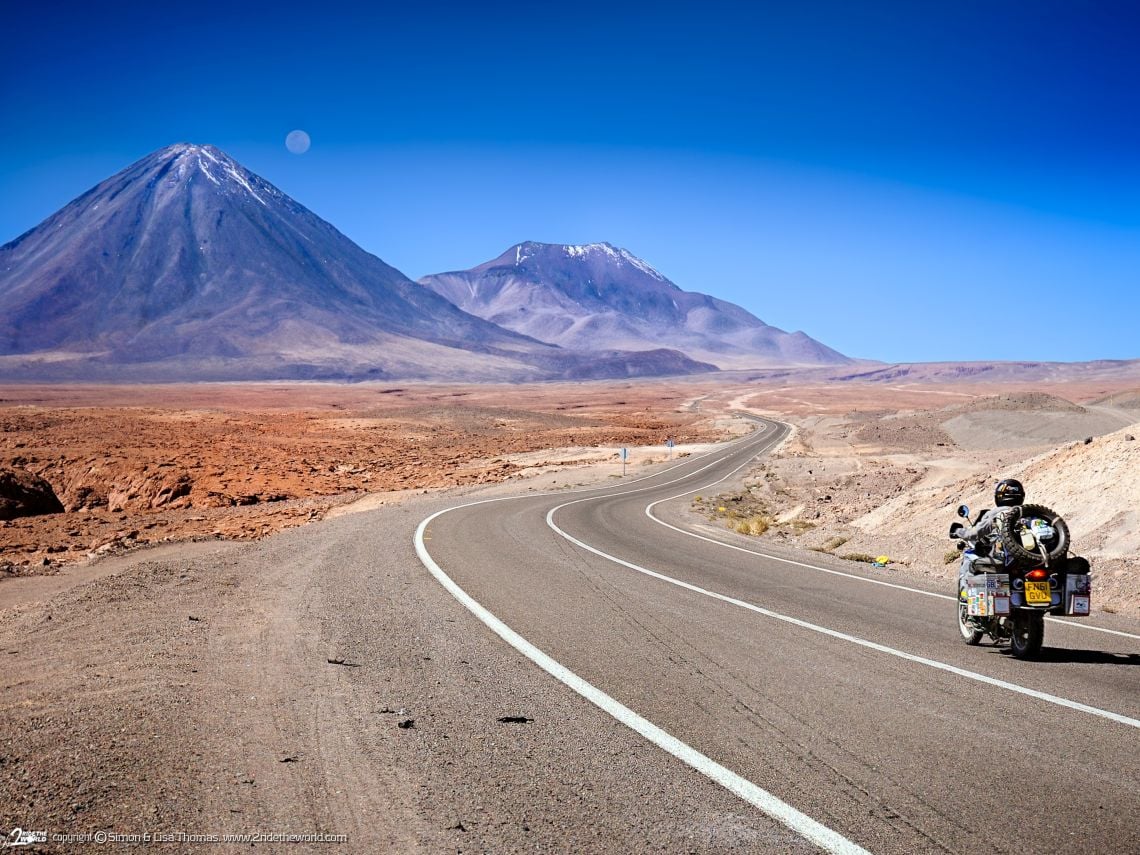
How do you fund a trip like this?
Lisa: Initially when we left it was only for a maximum of 18 months, we worked our arses off, saved as much as we could, sold a lot but kept our house and rented it out. At the three year point, knowing we needed to continue but with cash was drying up fast, we asked my father to sell our house and everything else (he was our power of attorney).
We managed to live on that for a period of time. Of course, it’s been so long now that that cash has all gone and we try to make our way as frugally as possible. We camp as much as we can, cook our own food and try to avoid overly touristy locations as this is where costs rise sharply.
We write for a few magazines around the world (unfortunately as a whole the pay is not great!) and have an online shop where we sell prints, t-shirts, calendars etc. Every little bit helps.
When we can, we give talks and presentations. Often the old barter system and trade exchange works wonders!
At the end of the day we are not making any money and the little bits of cash we bring in act as a band-aid over the money we haemorrhage most months, but hey; long time dead and all that!
You have a decent amount of sponsorship; has that been easy to get?
Absolutely not! It’s funny we get asked this a lot. But all of our equipment sponsorship has been obtained through chance meetings with decision-makers from where we’ve built a relationship.
We rode the first five years of our journey without any tangible support. It was only after we had put our money where our mouth was, literally, that any organisations were even interested.
Most big companies are approached on a weekly basis and are being asked to provide money or free equipment in the aid of some ‘cool’ project or another. It’s damn near impossible for them to allocate the man-hours or energy to research which projects have real commercial merit and so a blanket answer of ‘no’ is the norm.
What are the positives and negatives of being sponsored; are there any negatives?
We think we are extremely lucky with our equipment sponsors. Each and everyone has been obtained due to a personal ‘face-to face’ connection. So our sponsors seem more like friends and there is a mutual respect.
The positives are obvious – equipment sponsorship means that you can spend more of your own hard saved cash on the travelling part. It’s also fantastic to know that when a piece of gear plays up, the sponsor is going to ship you a replacement.
That piece of mind alone is worth a small fortune. We’ve not experienced any negatives. But we know of more than a few cases where people have literally handed over their itinerary and their journey, in order to leverage sponsorship. At that point, the journey stops being yours.
What advice do you have for anyone looking to get sponsorship?
First off represent yourself professionally.
No company is going to hand you money or equipment if your project does not have a clear identity, a set of goals and a clear understanding of what they are going to get in return for handing you some new shiny piece of equipment. Identify what makes your journey different.
There are literally hundreds of people on motorcycles going around the world right now. Do not bash potential sponsors over the head with the ‘charity card’.
If your raising funds for a charity mention this, but don’t use this as leverage to convince them that your project has merit. Be specific in exactly what you are asking for and why.
Where do you see home as now being?
Lisa: Wherever Simon is
Simon: Wherever Lisa is.
Has it been easy to maintain a relationship on the road?
Strangely yes, for us it’s easy. We used to spend so much time together prior to the trip anyway as over the years we worked together on and off.
Of course you still have the ‘husband/wife’ arguments, but disagreements are resolved quickly.
It’s important to not let things sit and fester – get issues out in the open, have a bloody good row and then get on with what’s important.
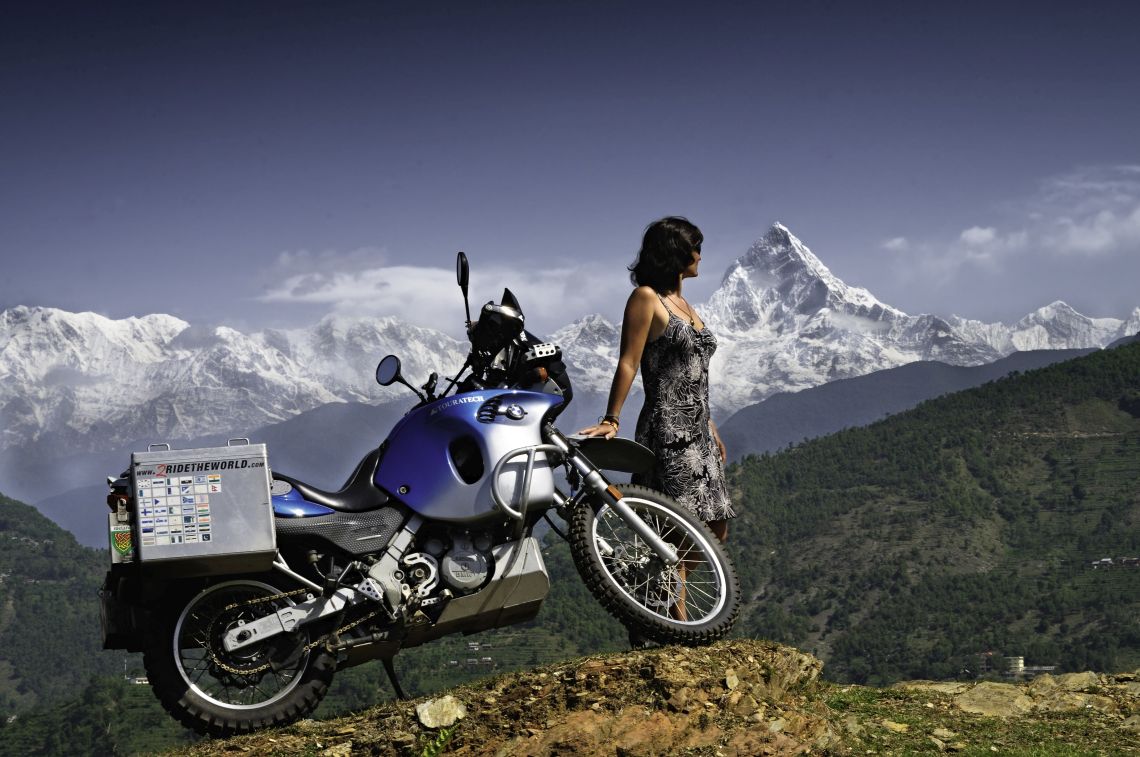
Do you sometimes wish you’d been doing it solo?
Lisa: Never. I cannot imagine doing this without Simon. He is not only my husband but my riding partner. Doing this without him would be (in my mind) pointless and like riding without any legs or arms!
Simon: Again – no. Being able to share the thrills, dangers and excitements of each day with Lisa, in my mind, somehow validates each experience. I love feeling that I’ve shared the most remarkable decade of my life with the coolest girl I know.
What are the key differences (benefits/ pitfalls) to doing a trip like this with a partner as opposed to with friends/solo?
We can only see the benefits. There are two of you to help each other during the difficult times-being able to share each and every day with the person you love is different than with just a good mate. Simon and I are so alike we don’t compromise one another.
We don’t give away parts of our journey just to appease the other. If you’re riding with a mate or a couple of mates there is always going to be the need for a little unwanted compromise where potential animosity can begin to grow as each rider changes his or her plans to better suit someone else.
That simply is not the case with us. We both know how lucky we are to be riding with our respective spouse and best friend.
Does the travelling still give you the same emotions as when you first set out?
Lisa: Actually no! I’m still as excited and sometimes nervous, but generally, I get a bigger sense of peace and relaxation when I’m riding these days. It’s almost like a drug and if I don’t do it I get the ‘jitters’! The bike has become more of a part of me and the journey doesn’t feel like a journey, but just how my life is.
Simon: No. Like Lisa said, I still get all of the excitement of moving on, seeing new places and meeting new people but I don’t have the anxiety that I had in the early days. For me being on the bike is like a meditation. When I’m on my bike I know exactly who I am. I simply love riding and don’t need to be seen doing it.
What’s the best part of a life on the road?
Being on the road! Knowing that we are making every single second count and that we are responsible for where we go, who we are, and possibly the people we can become. Oh yeah – and really good cheap beer in Malawi!
What is the worst?
Lisa: Being cold wet and hungry. Being overheated with no respite in 100% humidity. Being ill in a tent! Cockroaches.
Simon: Feeling powerless to do anything when you know your wife is in harm’s way. Luckily this hasn’t happened often but it’s a sickening feeling. Mosquito bites on your balls.
Have you become bored of doing what you’re doing?
Lisa: Absolutely not. I love it – every part of it… even the bits that are not so good! I still wouldn’t change it for the world.
Simon: We don’t have time to get bored. Between the riding, the website, the photography, the new friends along the way, the visas, the weather, the mechanics and our dire financial circumstance… we couldn’t get bored even if we wanted to!
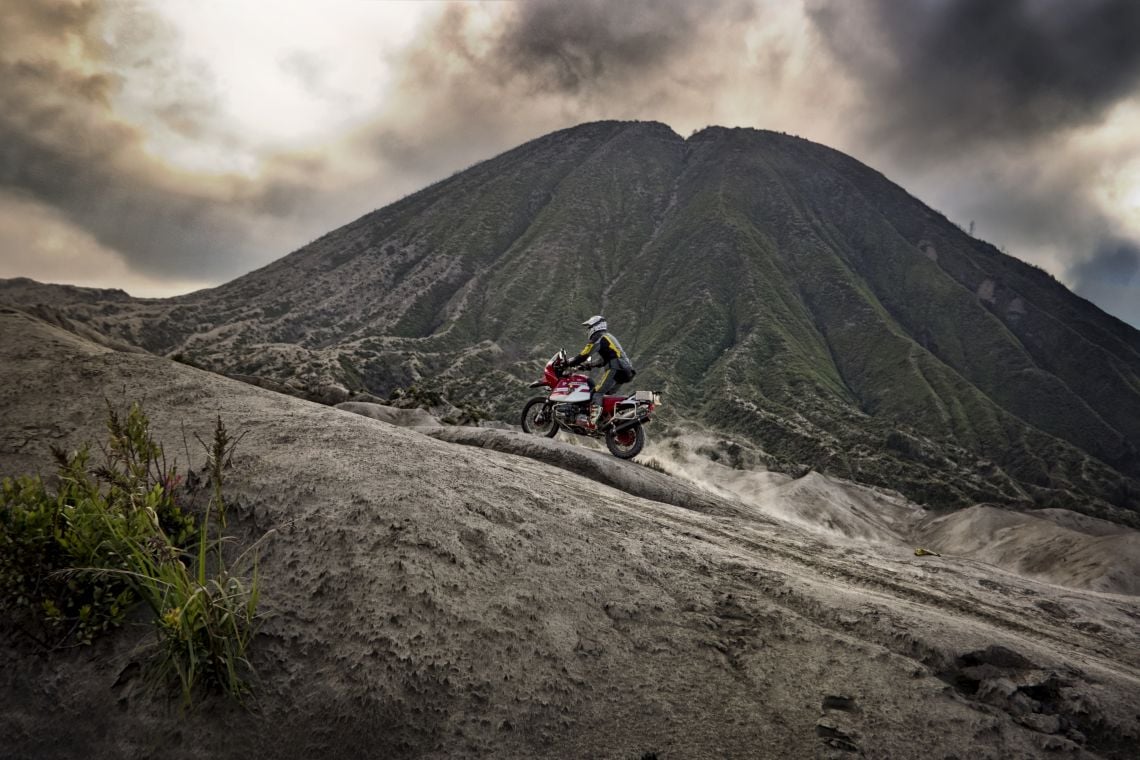
Is it as glamorous as it looks?
Haha! Glamorous is not a word we would use for what we do! Maybe for Ewan and Charlie, but for most people it’s tolerating the crappy stuff to experience the unique moments. If you’re travelling just short term you’ve got a budget and basically you’re on holiday so of course this can feel glamorous. You allow yourself to do things that feel decadent.
But trying to survive on the road with the bare minimum is just bloody hard work. But for us, it’s the right decision. There are days that are just downright spectacular like finishing your second day in the dunes of the Sahara, enjoying a joke with a Massai warrior in Tanzania; or joining in a singsong with a group of Karen-Long Necks close to the Burmese border.
These moments are pretty damn special. But the flip side of that is riding your bike in the jungle for three weeks half-paralyzed with a broken neck whilst your wife hallucinates with full-blown malaria!
How do you feel about it coming to an end one day; is that something you’re looking forward to, or dreading?
Dreading. The idea of being forced back into a monotonous 9 to 5 routine would kill us. But that said, the idea of being able to see close friends and family on a regular basis is exciting.
How do you follow up a trip like this?
Lisa: This kind of question makes my head hurt.
Simon: A plan, friends and family, a business, a shit load of energy and enthusiasm, and hoping things work out and if we’re lucky having a bloody good time whilst we do it. Who knows- maybe run a few tours to places we love – maybe get more involved in photography, write a few books, maybe a few films… anything is possible.
Do you think you could ever go back to a day job after this?
Simon: The simple answer is yes. Do I want to? No! But then again life is about doing what you have to so you can do what you want to Who knows what life has in store and the minute you think you’ve got it all planned and worked out – the world has a way of turning you on your head!
Lisa: No.
How do you think you’ve changed over the years, after so long on the road?
Simon: I’m a lot more relaxed; a lot more patient and I’m a lot more grateful than I ever was before to know just how lucky I was to have been born, raised and educated in the UK. It’s funny, I’m a lot more patriotic about being British having left than I ever was when I was ‘back home’. A mantra I’ve taken to heart ‘don’t sweat the small stuff ’.
You can’t control everything – there’s no way I could have got my head around that before I left the UK. Having been through 78 countries I’ve seen how most of the world lives (or should that be survives?) and by comparison I know I’ve had it easy.
Lisa: I think I’m a lot more understanding and more relaxed. I know we are both way more confident as individuals. I’m less angry and more accepting and a hell of a lot more patient! But then being at an international border for three days at the whim of a guard does have a tendency to teach you those lessons.
Is this global motorcycle adventuring for everyone?
Simon: No – luckily everyone’s different and for a lot of people the hardships we endure are simply not made worthwhile by the special moments we’ve described here. For a lot of people the sacrifices we’ve made just don’t make sense. For most people the idea of handing over their home and security for a bike and a horizon is unfathomable. It’s all about perspective. For Lisa and I, it’s just a case of knowing that we’d rather regret the things we’ve done than regret the things we haven’t done.
What kind of person is best suited to it?
Someone with an open mind. The whole point of travel is to be open to the idea that the journey can change you for the better. Having a bit of cash and a few languages under your belt doesn’t hurt either!
What do you make of the adventure bike boom; do you think it’s here to stay?
Yes, we do. When we left almost 11 years ago now, the adventure market really didn’t exist. It was a niche sector and if you didn’t ride a CBR or some other ‘plastic fantastic’ then you weren’t a ‘real rider’. We think the adventure boom will change a little bit and calm down, but the impact it’s had will definitely change how future bikes are designed and what they should be.
When we left every other magazine was all about how to get your knee down on your local roundabout – so for us its great to see the adventure market go from strength to strength and the emergence of quality publications like ABR (thanks guys, the cheque’s in the post)
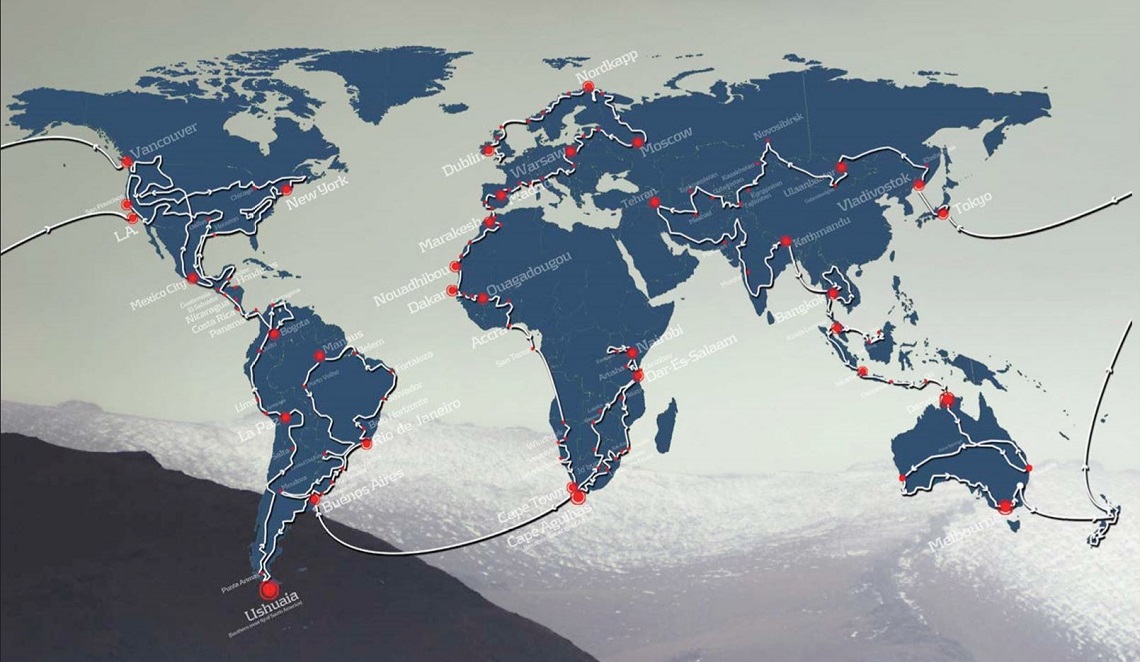
What do you make of the world as it stands today; getting better or worse?
Neither. The world is as it’s been for a while: it’s only the increase in communications, the internet and the speed at which this information is available which allows us to think that the world is rapidly changing for the worst. Most people the world over are good and most people are just looking to put food and water on the table for their families and get through their day as they have done for millennia.
That said, travelling is getting harder. Visas are getting more expensive, the application process more convoluted and the amount of bureaucracy is increasing year by year. Don’t even get us started about the bloody Carnet.
Cultures are melding and diluting as people round the world are watching TV and changing their lives based upon what the TV now purports to be the ‘norm’. We’ve sat on the edge of the Gobi desert in a Mongolia Ger, with a husband and wife glued to the small TV blaring out an advert claiming how much better their lives will be if they use a particular brand of hair conditioner… it’s bizarre, to say the least.
The world that we have seen on the whole has been generous, hospitable and kind beyond words and at times we have been genuinely humbled by the generosity of people whom seemingly have nothing. …See you down the road, ride safe, ride far!
What issues have you had along the way?
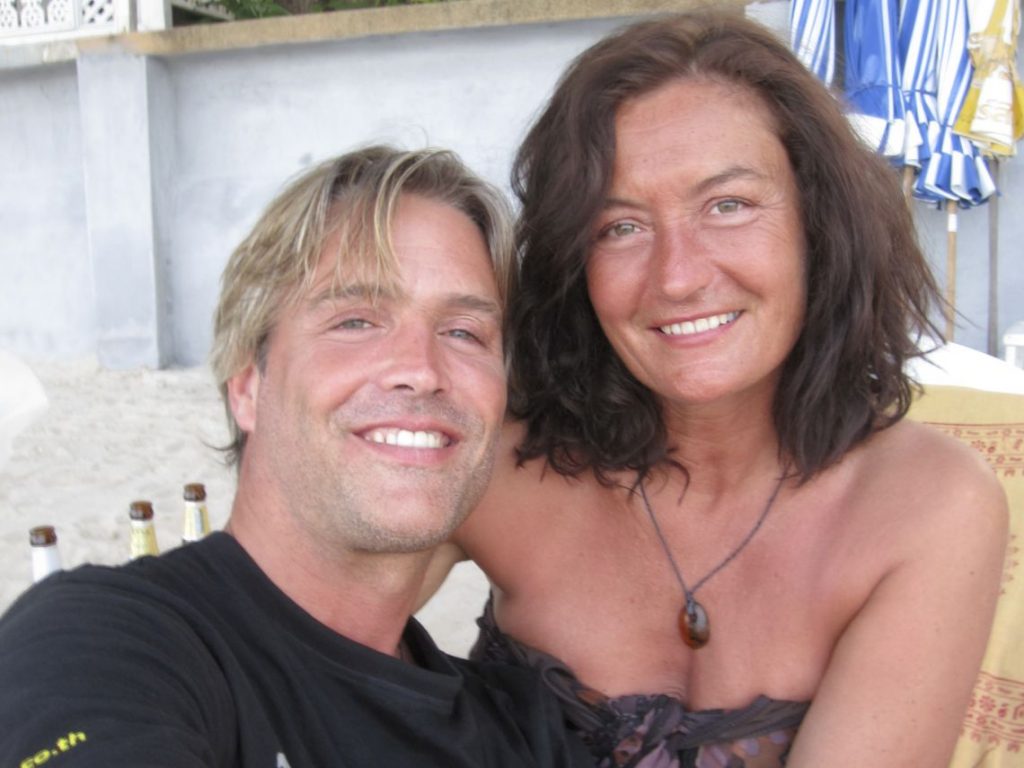
Oh, Christ! We need a bigger article. It’s been almost 11 years.
Okay, here’s a bullet fashion off the top of our heads…
- Broken drive shaft in the northern Sahara.
- Near-fatal panic as we put both bikes into a dug-out canoe crossing rivers in Africa.
- Gutting the inside (removing seats, walls, tables, toilet-everything) to get both of our bikes into a 12-seater non-cargo baring twin-propped plane to fly us past Nigeria.
- Two bouts of malaria each.
- Dengue fever.
- Epic cases of food poisoning.
- Several bouts of arse-numbing giardia. (Parasite absorbed by ingesting faeces- contaminated food or water)
- Then of course Simon’s near-fatal fall from the bridge in the Amazon jungle.
- After uncomfortable ‘feminine issues’ having to have a complete hysterectomy whilst still on the road (this was challenging!).
- My (Lisa) original rear suspension sheering at speed outside of Bogota in Colombia.
- Being stopped at gun-point by very young military dressed young boys north-west of Murmansk Russia… and in Tajikistan along the Afghan/Tajik border. More than a bit intimidating!
- Four road-rage attacks in the USA.
- Negotiating a land-mine field.
- The ongoing battle to obtain medications for my medical conditions (coronary) on the road. Repairing and totally rewiring the entire wiring harness on the 1100GS in the Amazon jungle.
- Fabricating temporary brake pads from the rusting carcass of an abandoned aeroplane in Brazil.
- Altitude sickness (Lisa) at 17,200 feet in Bolivia and again in Tajikistan.
- Being asked by strangers most days about how Simon and I maintain a normal (?) and happy marriage being on the road 24/7.
- Having to accept that in certain countries and within certain cultures I (Lisa) am Simon’s property and effectively a nonperson.
- Here’s an interesting one… learning to perform some very private functions whilst 20 to 30 strangers closely eye your every move! (mainly in Africa)
There are many, many more after so long on the road, but the most difficult for me (Lisa) was hearing and dealing with my father’s sudden and unexpected death while travelling on the other side of the world.
To find out more about Simon and Lisa’s amazing adventure and follow their progress, visit: www.2ridetheworld.com


